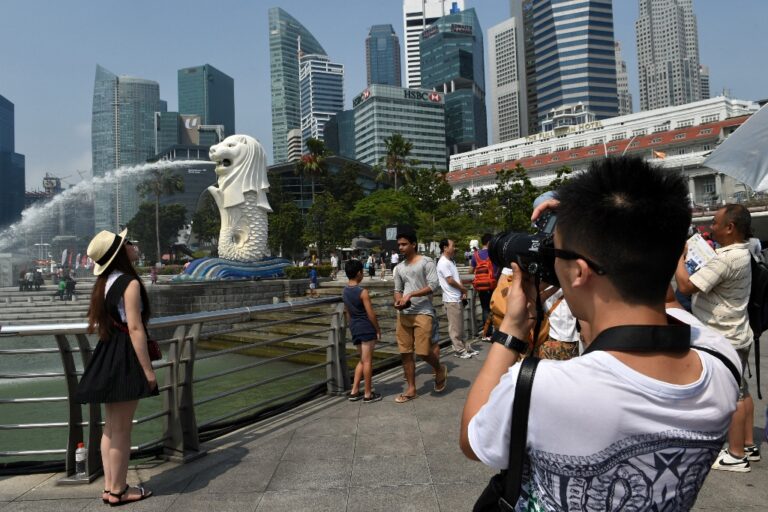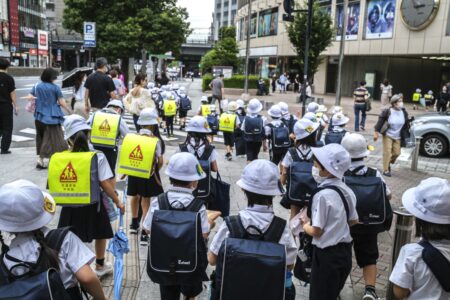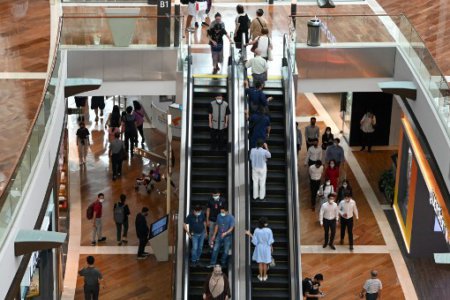
Singaporean universities have been a hit with Chinese tourists lately.
During China’s Golden Week celebrations — that is, the 7-day or 8-day national holidays that take place from October 1 every year — parent travellers and their children have packed Singapore’s hotels and buses to get a glimpse of the country’s top higher education spots.
It goes without saying, there’s a massive demand to study in Singapore.
Forget the glittering views of Marina Bay Sands or the shopping haven of Orchard Road; visitors instead clogged up the campus grounds of universities like the National University of Singapore (NUS), and the Nanyang Technological University (NTU).
It caused student peace to erupt into chaos — NUS halted access to their dining spots from September 30 to October 7, and NTU now charges a fee for tour groups coming in.
You read that right: tour groups.
Travel agencies in China took notice of Singapore’s imminent popularity, and ads for educational tours to the universities wracked social media sites. China’s Instagram-esque platform Xiaohongshu had more than 170,000 posts under the tag #SingaporeUniversityTourStrategy alone.
Which makes you wonder: what makes people choose to study in Singapore?
After all, the country — however prosperous it may be — isn’t perfect.
Not all that glitters is gold

While there’s no doubt about the quality of Singapore’s education, there’s been a long history of inequality imbued within its system. Source: AFP
Let’s cut to the chase: Singapore’s expensive, through and through.
In 2024, the Southeast Asian island city-state was deemed the second most expensive city in the world for expatriates by Mercer.
Whether you’re an international worker who’s lived there a long time, or a student taking a short-term stay, the cost of living remains since the value of the currency is so high. Rental prices off-campus alone range from a whopping 900 to 2,600 Singaporean dollars (US$688 to US$1,987) per month.
Secondly, there’s a rocket boom of competition.
The lucky number here is 97 — the country holds a literacy rate of 97.13%, and 97% of Singapore’s students move on to higher education after the age of 18.
Their affluent society blossomed from the fertile grounds of a well-built education system, but that doesn’t mean the aftermath looks a constant shade of pretty. With high academic pressure and comparison, many students experience a fear of failure from a young age.
This, in turn, means more hours put into studying, which also means less time outside of the books.
Naturally, many local Singaporeans have their sights on the best universities too, which narrows down the gap of access for foreign students. The NUS acceptance rate is extremely low, at just 5% — that’s 61% lower than the average rate for Asian universities.
And third: there’s a bias towards the wealthy.
“The bias towards students from affluent families has helped foster an elitist education system which contradicts one of Singapore’s most trident nation-building claims that it is a meritocracy society,” a Quora user says.
To put it simply, in a meritocratic education system, the level of opportunity is fair to all students — they take the exams, and the talent is based on achievement.
Singapore’s citizens are indoctrinated by this idea, that people are governed based on merit.
However, while there is plentiful room for students from low-income families to study in Singapore and perform well in standardised testing, there is a discrepancy between the experiences of those from lower socioeconomic statuses, and the affluent.
In 2015, 46% of disadvantaged students — those classified in the bottom 25% in terms of socio-economic index — were attending “disadvantaged schools.”
These are schools which lack the resources to provide holistic learning; schools that may not have the best teacher quality, sufficient funding, and infrastructure.
And that’s just one, singular problem.
It’s important for students to know the downsides to any country they dream to study abroad in, because it takes away the sugar-coating and shows them exactly what to expect. No country out there is perfect, and that’s why preparation is key.
So with all that baggage weighed, here’s why Singapore’s a great location to pursue your studies abroad.
5 good reasons to study in Singapore

The Singaporean education system ranks among the top 10 in the world. Source: AFP
Top-notch education
Through primary, secondary, and higher education, Singapore stays ahead of the curve. NUS and NTU are the top two universities in Singapore, ranking at #8 and #15 worldwide in the QS World Rankings University 2025.
To get into a university in Singapore, you must have completed high school, English language proficiency test scores with IELTS or TOEFL, previous high school transcripts, and if applicable a CV and professional references.
You can provide recommendation letters from past teachers, and some programmes may require a research proposal. A student visa takes between two to four weeks to process and costs 30 Singaporean dollars (US$22) for application and 60 dollars (US$46) for issuance.

Students who’ve graduated from top universities can stay up to two years in the country to find a job. Source: AFP
The post-study work visa
The post-study work visa in Singapore, also known as a Long-Term Visit Pass allows you to stay in the country for up to two years after graduation to find a job, but you need to be getting your degree from an accredited Institute of Higher Learning.
Once you land the job, you’ll be eligible for the S Pass which most fresh graduates take on to remain and work in Singapore for up to two years and earn a fixed salary.
It comes with medical insurance from your employer, and can be renewed for up to three years when the pass expires — dependent on eligibility, of course.
Some of Singapore’s top companies include DBS Group, United Overseas Bank Limited, and Singtel. Source: AFP
A thriving economy
Even though the city-state is no more than a tiny dot on the world map, Singapore has the #1 economy in Southeast Asia, and the #4 for 51 high-income group economies. It’s a hub for international trade and is known for its thriving industries in manufacturing, pharmaceuticals, financial services, agritech, and more.
That means as a student, you’re getting first-hand access to industry connections.
At university, you’ll get to take on real-world projects or internships and build a world-class network to set you up for a career post-graduation.

In Singapore, you’ll get to witness a colourful landscape of culture mixed cultures. Source: AFP
A multicultural experience
A rich history of international trade in Singapore has long instilled a diverse pool of communities within the country.
When you study in Singapore, you’ll be exposed to a cultural melting pot, with the three predominant groups of people being Chinese, Malay, and Indian.
You’ll hear a mix of languages walking down the street, taste an exotic wheelhouse of cuisines, and interact with students from different ethnic backgrounds. As an international student — that’s an experience that primes you with an open mind and cultural literacy.

Buses in Singapore are built to be wheelchair accessible. Source: AFP
The modern and accessible infrastructure
As the safest country in Asia, and ranked fifth on the 2024 Global Peace Index — Singapore is the place to go to live your student life on-and-off campus as swiftly as possible. The country holds a low crime rate, with violent crime and theft a rarity. It’s known to be a safe place for female solo travellers too.
They’re not only developed economically but infrastructure-wise as well.
There’s wide access to public transportation, a high standard of living, and an ease of travelling to other countries in Southeast Asia from within Singapore through Changi Airport.










